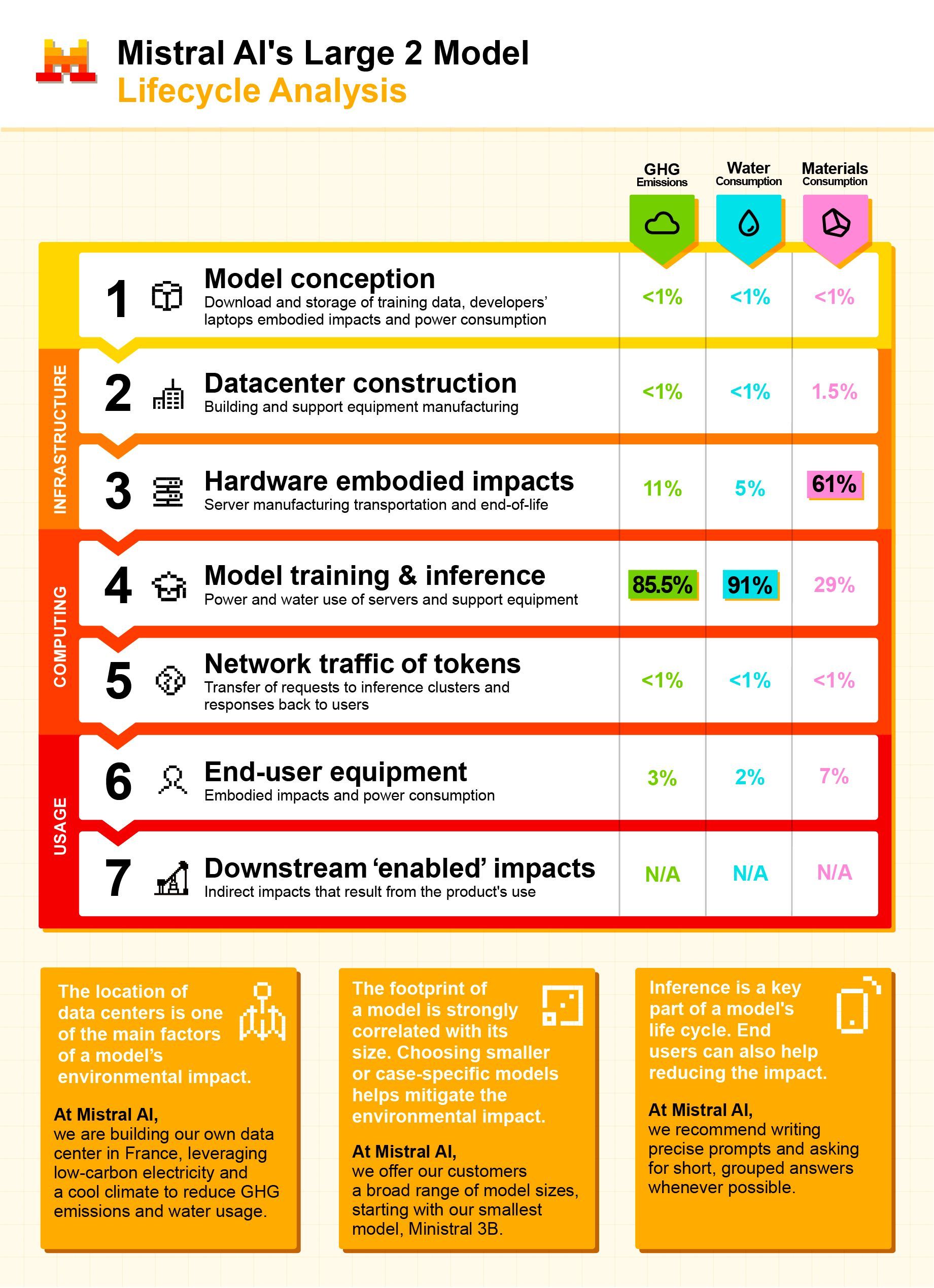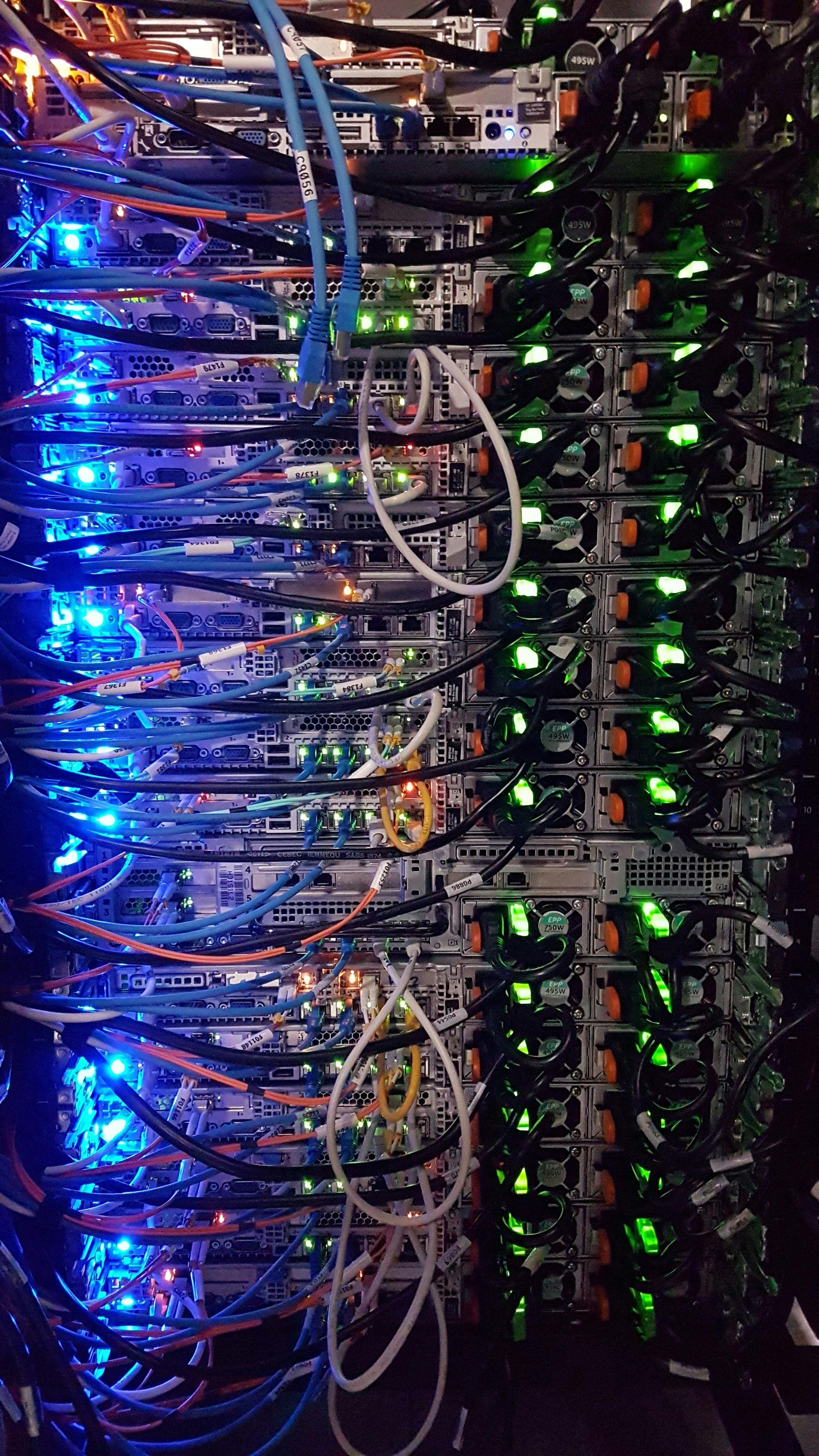A New Milestone for Environmental Transparency in Generative AI
Life Cycle Assessment of an LLM from Mistral AI
As generative AI reshapes industries, its environmental footprint still escapes proper scrutiny, as pointed out by many researchers in the field¹. To help close this gap, Carbone 4 conducted, on behalf of Mistral AI and with the support of ADEME, a comprehensive Life Cycle Assessment (LCA) of one of the large language models (LLMs) developed by Mistral.
This is the first time a major player in generative AI has publicly released audited, quantified results based on a robust methodology, over a complete perimeter and fed by real data from operational large-scale models. By including every phase of the life cycle, from hardware manufacturing to model training and inference, the study provides the first full picture of the carbon, water, and resource impacts of these technologies.

The results of the study confirm the orders of magnitude observed in the scientific literature on the environmental impacts of AI. Two key insights emerge from the analysis:
- Hardware-related impacts, especially from the manufacturing of GPUs, CPUs, and data centers, account for a significant share of the total footprint. Yet measuring them precisely remains a challenge due to limited available data. Greater transparency from players in the GPU value chain, such as NVIDIA, is necessary to refine analyses and increase results reliability.
- Electricity consumption during training and inference is the main source of emissions. Unfortunately, current carbon accounting rules for so-called “green” electricity do little to accelerate decarbonization (see Carbone 4's article on this topic : https://www.carbone4.com/nzi-for-energy-publication). What's more, access to low-carbon electricity, a major challenge for decarbonization, is likely to come under pressure from competition for use. Stronger planning on a regional scale would seem to be required to complement markets.
Beyond accounting, a key contribution of this work is to lay the foundation for a shared framework to improve transparency and comparability across the AI sector. All players in the value chain are thus invited to publish robust and comparable results, over a complete perimeter and compliant with life-cycle analysis standards This is a requirement for informed decision-making, whether for public decision-makers, corporate customers or private individuals. Even players seeking to develop virtuous uses of generative AI need information about its impacts, in order to calculate their “Environmental Return on Investment”.
Climate action does not end with measurement and disclosure. To stay within the Paris Agreement boundaries, several actions are needed:
- Promoting more frugal use: firstly by questioning the necessity of using generative AI and the need to save time, and secondly by avoiding unnecessary queries, choosing models appropriately sized for the task, and favoring short, targeted outputs. Environmental performance criteria could also become effective levers in both public and private procurement strategies.
- Developing a systemic view of the sector’s impacts: by incorporating the downstream uses that AI catalyses, which can be highly emissive, and disclosing, for example, a “green share” indicator for analyzing tech companies' customer portfolios. This approach, inspired by climate finance methodologies, would help shed light on the real-world impacts of AI and bring business strategies closer in line with global climate goals.
In March 2025, Carbone 4 warned about the environmental footprint of generative AI and the lack of transparency of major LLM suppliers. Mistral AI now shows that another path, more open and demanding, is possible. Let’s hope and act so collective action follows!
👉 Read Mistral AI’s published study: https://mistral.ai/news/our-contribution-to-a-global-environmental-standard-for-ai
👉 Read Carbone 4’s feature article on the environmental footprint of AI: https://www.carbone4.com/en/generative-ai-generating-climate-change
Acknowledgements
This project was made possible thanks to the dedication of Carbone 4’s It & Digital Practice, in particular Hélène Chauviré, Mujahed Darwaza, Benjamin Paulmier and Zénon Vasselin, and to the instructive dialogue with the teams at Mistral AI and ADEME. We also thank Resilio and Hubblo for their independent audit of the study.
Carbone 4 supports all digital players in assessing and reducing their environmental footprint, helping them find their role in a resource-constrained and rapidly changing world. To get in touch with our experts: https://www.carbone4.com/en/contact
Subscribe to our monthly newsletter for updates, events, and publications: https://www.carbone4.com/en/newsletter-carbone4
[1] : Misinformation by Omission: The Need for More Environmental Transparency in AI, Luccioni et al., 2025, https://arxiv.org/abs/2506.15572
Contact us
Contact us about any question you have about Carbone 4, or for a request for specific assistance.









